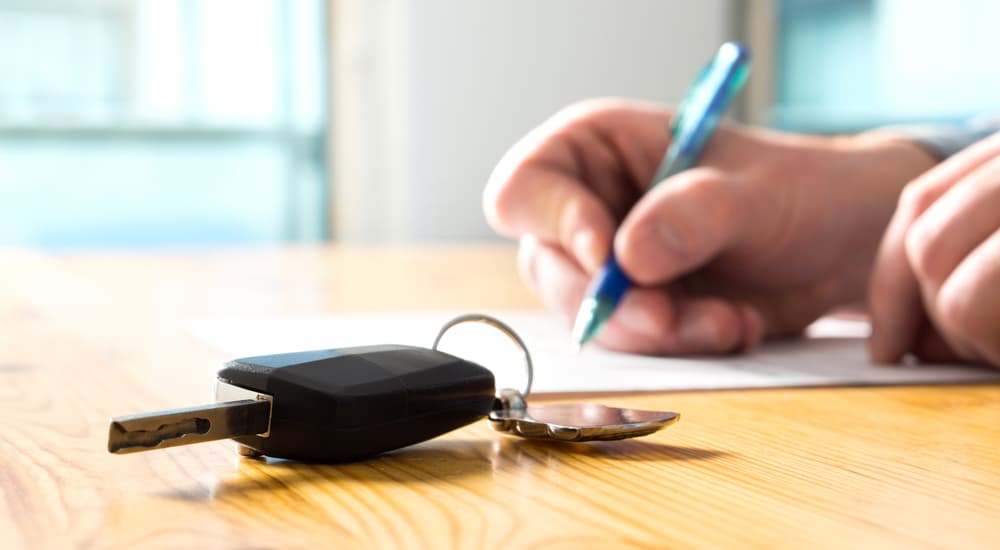The time has come, and you’ve arrived at the decision that it’s just time to sell the vehicle you’ve loved or maybe hated since the day you drove it home. Maybe you’ve hemmed and hawed about that decision for a while because it really is a darned good rig. Or maybe you recently paid off the loan, got your title in the mail, and decided you really just miss that little crying sound your wallet makes when you pay a monthly car payment. Regardless of your reasoning, you likely have some questions. Things like, “What paperwork do I need to sell my car?” or, “Do I trade it in or sell it privately?”
We’re glad you asked…
Private Sale or Trade-In?
Once you’ve arrived at the decision that it’s time to off-load a vehicle, you have a couple of options. If you need to replace it immediately, it could be most beneficial to take it to the dealership where you intend to purchase a new vehicle and trade it in, thus knocking a bit off of the sticker price of your new ride. If you aren’t in a huge hurry to get rid of it, and you’re up to the task of seeing to the somewhat nebulous legal details, selling it privately may yield a better price. Either way, you will want to get a ballpark idea of what it’s worth.
There are a bunch of sites on the web where you can input your vehicle’s information and overall condition and get a rough estimate of what you should expect to be given in either a trade-in or private sale transaction. Kelley Blue Book is a long-standing and reliable resource, and the one most consider the gold standard for determining the value of a used vehicle. In general, the prices will be in the same basic neighborhood regardless of which site you use. Typically the price will be higher for privately sold vehicles than for trade-ins.
Since dealerships are apt to walk you through the process of trading a vehicle in and will handle most of the paperwork for you, we’ll assume you’ve opted to go it alone, and we’ll walk you through the process of selling your car privately.
CARFAX
Many people who buy used cars rely on a third party like CARFAX to reveal any pertinent details about a specific vehicle, such as accidents, recalls, ownership history, and title history. A vehicle may look great and sound like a good deal, but it could be a game-changer for a prospective buyer to find out it’s an automotive Humpty Dumpty, and all the king’s men Bondoed and pop-riveted him back together again. Likewise, learning it really is as awesome as you say it is could seal the deal more quickly. Assuming your car is on the up-and-up, it can’t hurt to spend $39.99 to have a CARFAX report to give potential buyers as a show of good faith.

Hear Ye, Hear Ye!
Once you’ve done a bit of research to come up with an asking price and have obtained a full CARFAX report, it’s time to tell the world you have precisely the vehicle they need sitting right there in your driveway. There are lots of places online to advertise: Facebook Marketplace and Craigslist are among the most popular with reliably good exposure. If you are selling collectible, vintage, or rare vehicles, it may make sense to advertise to a more targeted audience by posting your ad with local car clubs.
What Should My Ad Say?
More often than not, prospective buyers are going to be turned off if your ad is either too short, omitting vital details that might inspire them to look twice, or too long. Nobody needs to know about that time all three of your kids got carsick on the way home from Disney World, and that’s why the color of the upholstery in the back is a shade darker than in the front. A good example of an adequate online ad can be found below:
2012 Toyota Corolla LE Sedan For Sale!
- Bought new in 2012. One owner, well-maintained, CARFAX and all repair and maintenance records available. Clean title.
- Asking $6300.
- Front Wheel Drive
- Automatic transmission
- Sunroof (tight––no leaks)
- Leather interior––clean, non-smoker, no pets
- Power windows, power mirrors
- Professionally-installed Rockford Fosgate tweeters, mids & subwoofer
- Alpine amp (custom install)
- Aftermarket LED foglamps
- A/C (works great)
- New Pirelli P4 Tires
- Very small blemishes in paint (see photos), small dent on right front fender, no rust
Call or text [your name] for more information or to arrange to take a look!
**Post as many photos of the vehicle as you can, including any shots you have of dings or minor dents
Tire Kickers and Talkers
Sometimes, when the planets align perfectly and the powers that be are feeling merciful, selling a car privately is quick and painless. More often, you will have to endure at least one interaction with a person who wants to talk you down, citing every nick in the paint, every minuscule stain in the carpet, and every tiny flaw as a reason why you’re asking too much and should accept their low-ball offer. Some may be perfectly happy to pay your asking price, but only if you’re willing to take payments, and others still might haggle or try to barter their way into a lower price. After taking a thorough look at your car, any sentence that starts with, “Tell you what…” or “How about…” is apt to be followed by something other than, “… let me run to the ATM.”
A Buyer Cometh
Eventually, someone will come along, and you’ll make a deal that works great for everyone. Ideally, they’ll have driven the vehicle, and if they aren’t mechanically inclined themselves, they’ve had someone look the vehicle over to assure there are no major defects or concerning mechanical issues. They’ve looked over your maintenance and repair records, they have seen that the CARFAX report has revealed no surprises, and they have either a pile of cash or a cashier’s check in hand with the expectation that they’ll be able to drive away in their new-to-them vehicle. They can––if you’ve taken care of your part.

Seller’s Homework
It all boils down to documentation. It would be super spiffy to be able to just give your well-organized and clearly labeled three-ringed binder of records, receipts, and legal documents to the new owner, but there are maybe three or four people on the planet who are that organized and on top of things.
Additionally, there is a list of documentation required by law:
Original Certificate of Title
On the back of the form, the buyer’s and seller’s information should be filled out accurately and completely in order to transfer the title from the seller to the buyer. What information is required depends on your state, so be sure to read the instructions carefully. Titles will often require:
- The buyer’s name and address
- The date of sale
- Seller’s signature & printed name
- Odometer reading
- Notarization
If you don’t have the original title, you must obtain an official copy from your state DMV. The title is proof that you own the vehicle, and you cannot legally sell a car without having the title.
Bill of Sale
Although not required by all states, it never hurts to fill out a bill of sale. A bill of sale describes the vehicle, the date it was sold, and how much it was sold for. It must be signed by both the buyer and the seller, and copies are kept by both parties. This document is an important record of the transaction and can protect you down the road. Check your state’s laws to see if there is an official bill of sale template that you need to use.
Got it? Good!
We know it seems like a lot of red tape to endure just to off-load a vehicle, but we don’t make the rules, and we sure as heck don’t break them, which is just the sort of behavior that makes things like the bill of sale and other legal documents a necessary evil. Selling a used car privately is already enough of a hassle; you don’t want it to come back to haunt you by playing fast and loose with the paperwork.
Once all of those ducks are in a row and the cats have been sufficiently herded, the buyer may indeed take those keys and their pile of papers and drive off into the sunset while you figure out what you’re going to do with your new-found riches. Of course, if you don’t feel like trying your hand at selling your car yourself, you can always head to your local dealer and let them handle the paperwork for you.



